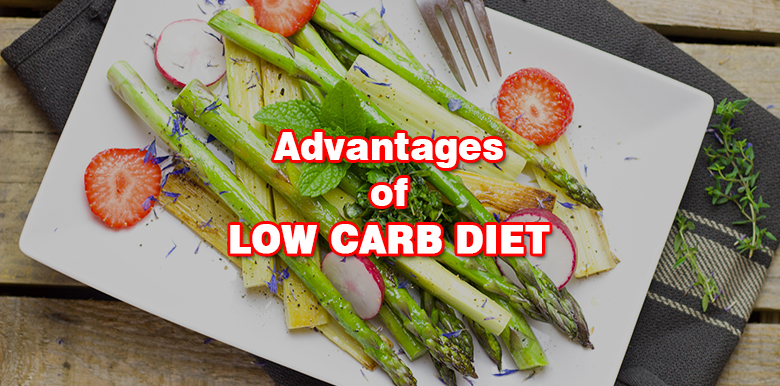A Low Carb Diet is a way of eating that restricts the amount of carbohydrates and increases the amount of healthy fats that you eat to optimise your health and nutrition.
We do this by eating real, whole foods that are not processed – the type of foods our bodies were designed to eat.
In practice this means removing sugar, bread, pasta, rice, beans, starchy vegetables (i.e. potatoes) and processed foods from your diet. There is no nutritional need for any of these foods that cannot be found from other sources and carbohydrates are simply not an essential nutrient. This also means eating plenty of non-starchy vegetables, meat, eggs, butter, cream, olive oil and nuts.
While this way of eating may initially appear restrictive and unsustainable, this approach to nutrition allows you to eat a delicious and varied diet that leaves you feeling satisfied. It allows you to eat when you are hungry and still lose weight while improving your health and controlling your blood sugar.
Low carb has been used as a weight loss method for at least 150 years, and modern studies confirm that it is more effective than other diets.
It’s hardly a coincidence that avoiding carbohydrates – like sugar and bread – has a special effect, beyond just focusing on calories. Carbohydrates, more than other foods, stimulate the release of the hormone insulin. And insulin is the body’s main fat-storing hormone.
This means that to lose excess body fat your number one goal should be reducing insulin levels. And to do this, the first and most important thing is to eat fewer carbs – a low-carb diet. For many people this is enough to reach their goal weight.
How it works –

Low carb diet
Weight loss is often simply thought of as a question of calories – eat less, and burn more, and you’ll lose weight. This is true in theory, but not very practically useful – as evidenced by a massive obesity epidemic during the period when people believed this.
The big problem with focusing on calories is that it ignores hunger. It ignores the body’s regulation of its fat stores. It ignores the fact that we do not eat calories, we eat food. And food is so much more than just calories. Some food (usually low carb) makes you feel satisfied. Other things (like soda) just make you even more hungry.
The basic idea of low carb is to work with the body, instead of against it. Instead of wasting time and willpower by restricting calories, exercising and enduring hunger, we do something else. We make the body want to eat less, and burn more of any excess.
This is done by altering the hormonal balance. And one hormone above all others is fundamental to do this: the fat-storing hormone insulin.
Lowering insulin increases fat burning, enabling the release of stored body fat. In the long run, this results in reduced hunger and even increased energy expenditure, even without exercise.
Advantages of Low carb Diet –
1. Low-Carb Diets Reduce Your Appetite
Hunger tends to be the worst side effect of dieting. It is one of the main reasons why many people feel miserable and eventually give up. However, low-carb eating leads to an automatic reduction in appetite.
Studies show that when people cut carbs and eat more protein and fat, they end up eating far fewer calories.
2. Advantage Of A Low-Carb Diet On Blood Sugar and Insulin Levels
Eating carbohydrates have the biggest impact on our blood sugar and insulin levels. Restricting carbohydrates in our diet has a direct result in lowering our sugar levels and insulin needs. High sugar levels play a part in almost all chronic diseases such as type 2 diabetes, dementia, cancer and cardiovascular disease.
3. Losing weight on low carb
Low carb has been used as a weight loss method for at least 150 years, and modern studies confirm that it is more effective than other diets.3 Lots of people have experienced it.
It’s hardly a coincidence that avoiding carbohydrates – like sugar and bread – has a special effect, beyond just focusing on calories. Carbohydrates, more than other foods, stimulate the release of the hormone insulin. And insulin is the body’s main fat-storing hormone.
This means that to lose excess body fat your number one goal should be reducing insulin levels. And to do this, the first and most important thing is to eat fewer carbs – a low-carb diet. For many people this is enough to reach their goal weight.
4. Beat your sugar cravings with low carb
A low carb diet without sweeteners is very effective at reducing sugar cravings. Not only will you feel satisfied, but also your cravings for sweets will also be significantly reduced.
For many people this is enough to stay away from sweets, enabling weight loss, type 2 diabetes reversal and other health benefits. But if you’re truly addicted to sweet foods then low carb is just a necessary start.
5. Reduce acne problems with low carb
Many people experience improvements in acne on low carb.
This is very likely no coincidence, as modern studies show a probable connection between high-glycemic (high-carb) diets and acne.
This may be caused by the effect on growth hormones like insulin and IGF.
To improve acne, your best bet is a fairly strict low-carb diet – ideally one that is also low in dairy products.
Studies show that low-carb diets result in weight loss and improved health markers. These diets have been in common use for decades and are recommended by many doctors. Best yet, there’s usually no need to count calories or use special products. All you need to do is to eat whole foods that make for a complete, nutritious and filling diet.
